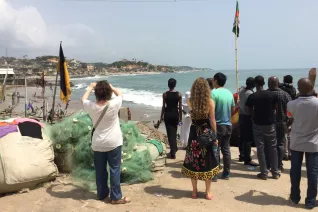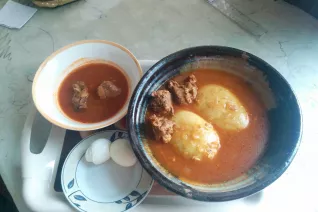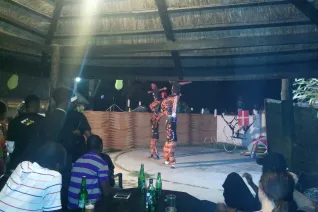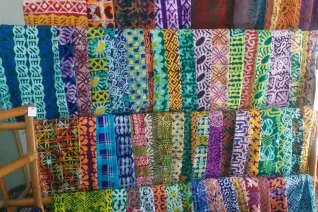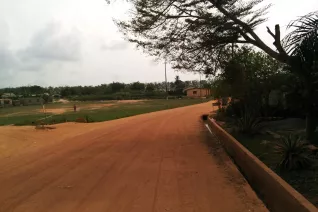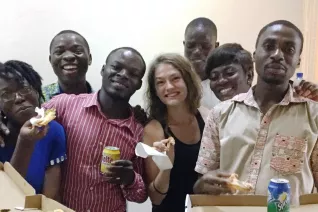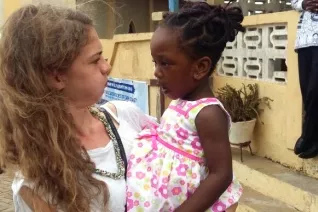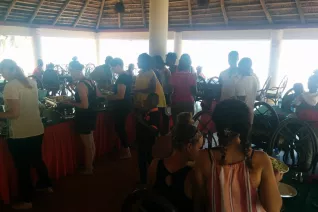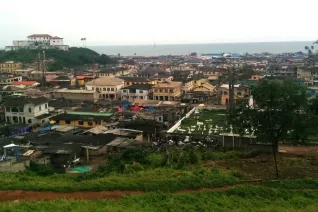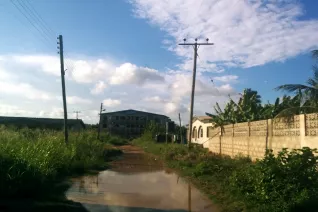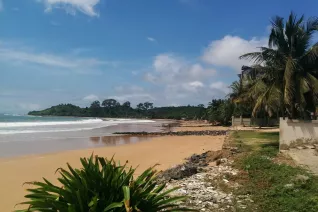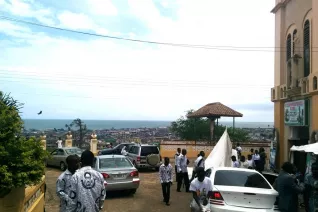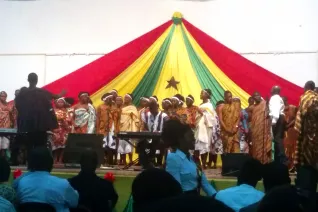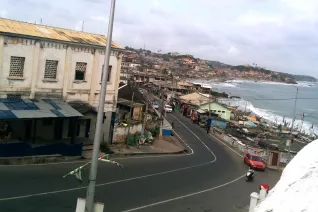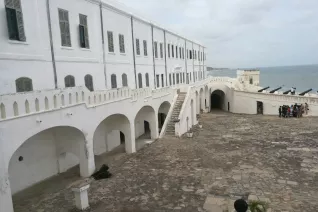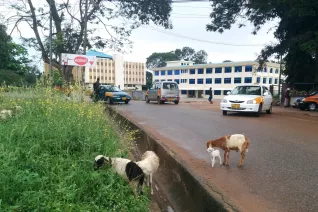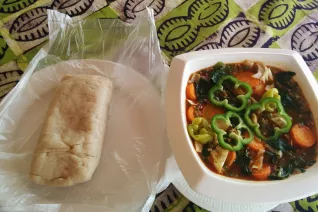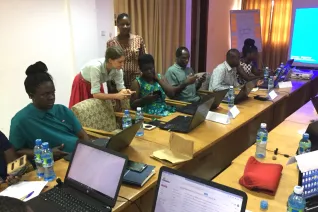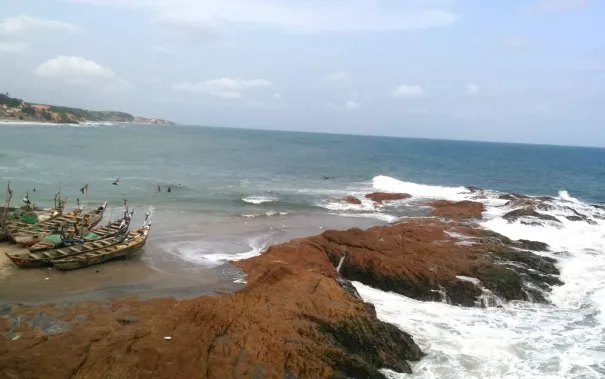Communications and Marketing
[Archive] There and back again: H-BRS Student in Ghana (2017)
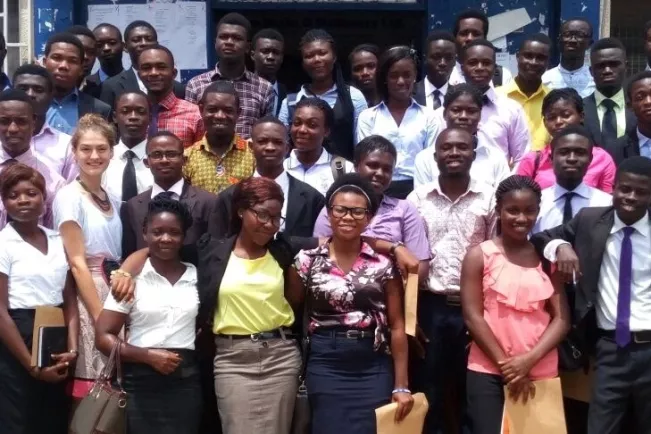

H-BRS: What gave you the idea of going to Ghana, and how did you finance your trip?
Lioba Visser: Since our course (Business Management) has a mandatory practical semester, I thought that I would combine the necessary with the interesting and go abroad. I owe the fact that my destination was Ghana to the Vice President, Jürgen Bode and his Africa Project, as well as Regina Brautlacht from the Language Centre, who is in charge of the Intercultural Student Project between H-BRS and its partner institution, Cape Coast University. Through these channels I also received a scholarship for my Bachelor's thesis about the market research that I carried out during the practical semester.

H-BRS: You spent half a year living and working in Cape Coast. How does life in Ghana differ from everyday life in Europe?
Visser: At first it was a completely new world for me. Where else would you find a family of painted chickens crossing the road in Superman capes on your way to work? Where else is traffic conducted by volunteers who are paid for their work in tips? These are just two impressions that perhaps give you a small idea of just how different things are there.
But they are “exotic”, visual impressions; ultimately it was the people there who impressed me the most. Ghanaians are unbelievably tolerant, especially towards other religions. I saw my Catholic colleagues singing Muslim songs at joint celebrations – even though the people are very religious. They are very open-hearted towards foreigners, but always polite and full of respect.
Naturally there is also another side: police who randomly close a road and demand money for permission to continue driving. And the fact that the children of the poor have to work to earn money is unfortunately completely normal.

H-BRS: You worked on the campus of Cape Coast University (UCC). Can you describe it a little?
Visser: The campus is enormous, like an actual town! Thousands of students live on the site, and there are shops, a hospital, a fire station, countless student halls of residence and churches, and last but not least the shuttle buses, without which everyone would have to spend so long walking from A to B.
H-BRS: OK, now down to business: what was your placement like?
Visser: I was employed on campus as a research associate and supported Professor Daniel Agyapong with a student project on intercultural communication and a workshop on the subject of e-learning. But for my actual industrial placement job I worked as a market researcher in a Nigerian company. They wanted to know if the Ghanaian market was ready for another laundry starch product. Treating clothing with laundry starch is a daily occurrence here.
I drew up a rather comprehensive questionnaire: Where do people buy this product? Which advertising media are noticed the most, how should the product smell, what kind of packaging is preferred? Should the product be in spray or powder form?
The questionnaires went out by post to over 500 distance students of the UCC, a very varied group, the majority of whom worked and earned money. I received 350 replies, which I evaluated and transferred manually onto the internet. The result was very positive for the company: the market for laundry starch in Ghana is a long way from being saturated.

H-BRS: Wow, you worked pretty hard! Was there much time left over for leisure activities?
Visser: I travelled a lot, visited the capital, Accra, and saw the old slave forts in the town of Elmina with my Ghanaian housemate. On the evening of a typical work day volunteer helpers from abroad often met on the beach in Cape Coast where two Germans from the south run a bar and hotel. It was a typical international meeting place, very relaxed.

H-BRS: On the subject of restaurants, what do people eat in Ghana, except for pizzas delivered from the takeaway?
Visser: (grins) The pizza with my colleagues was a one-off. There is often rice or fufu, a pulp of yam roots and plantains. The Ghanaian women are all pretty strong thanks to the strenuous way that fufu is made with a giant mortar. Another special thing is that everything is eaten by hand here, even soup. It takes a bit of getting used to at first.
H-BRS: Lioba, thank you very much for taking so much time for us and thank you also for all the photos that you brought back with you from Ghana.
The interview was conducted by Juri Küstenmacher
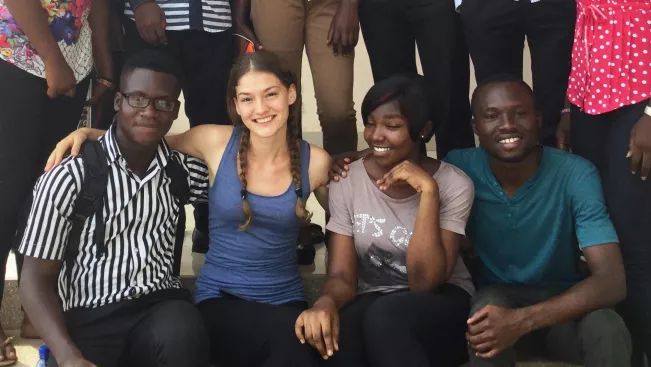
A small photo gallery
